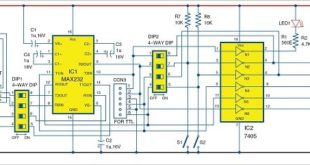In this article, we would be short reviewing various Chip and PCB Design Tools such as Allegro PCB Designer, KTechLab, Altium Designer, Oregano and Scilab.
Allegro PCB Designer
Visit: website
Full version: Paid
Allegro PCB Designer, made by Cadence, is an interesting design tool for any scale, from concept to production in a constraint-driven design system. It can be used for high-end applications like high-speed designs, RF antenna, flex-circuitry and design for manufacturing (DFM) use cases. The tool packs a number of features that improves its usability, including real-time DFM checks, single front-to-back constraint management environment, advanced rigid-flex design capabilities, integrated RF/analogue designing and mixed-signal design environment, real-time push/shove etch editing, real-time plowing/healing with dynamic shape technology, net scheduling, timing, crosstalk, layer set routing, geometric constraints and documentation editing.
Visit: website
Full version: Free
KTechLab is an open source circuit designer integrated development environment for microcontrollers (MCUs). It supports circuit simulation, MCU program development and analogue programming of MCUs and their application circuits. It features automatic routing and a library of common electronic components and logic component simulators. Some more features include support for real-time emulation and debugging, support for C, Assembly and other high-level programming languages, and graphical formats for MCU programming.
Altium Designer
Visit: website
Full version: Paid
Altium Designer, created by Altium Ltd, is an electronic design automation (EDA) software package for PCBs. It packs many usabilities in EDA, including schematic design, PCB layout creation, full-3D rigid-flex design and more. The user interface is easily navigable. 3D design environment ensures accurate component placement and functionality. Output data of the design can be documented in many formats. Altium Designer also allows work on legacy information.
Visit: website
Full version: Free
Oregano is a graphical software application that, together with an externally-installed simulation engine, provides a simulation platform for circuits. Its USP is an easy-to-use graphical user interface and simple drag-and-drop operation. It is mainly intended to run on Unix-like operating systems such as Linux, FreeBSD and more. To perform actual simulation of circuits, you need to install another package supported by Oregano, like ngSpice or SPICE, both open source circuit simulator engines for digitally checking the integrity of planned circuit designs. Oregano comes with a set of default inbuilt component libraries. You can choose from multiple libraries, such as default, TTL, linear, CPU or power device. Each library includes most corresponding components used in circuit design. Clicking on a component element provides you with a preview of the relevant schematic. You can export outputs in formats like SVG, PDF, PNG or postscript.
Visit: website
Full version: Free
Scilab is an open source and free numerical computing software platform, which can also be used for advanced digital programming. Cross-platform compatible, Scilab can be used for signal processing, statistical analysis, image enhancement, fluid dynamics simulation and numerical optimisation. It can be used as an open source alternative to tools like MATLAB. The software can carry out 2D and 3D visualisation, control system design and analysis using standard algorithms, signal processing and modelling hybrid dynamic systems using Xcos. Its language provides an interpretive programming environment in which matrices are the primary data type. Using matrix-based calculations, dynamic typing and automatic memory management, many numerical problems can be expressed in fewer lines of code compared to similar solutions using traditional programming languages.
This content was originally published here.








